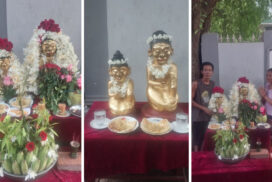By Sann Ni Lar Winn
The Five precepts prescribe for every Buddhist consist of:
(1) abstaining from killing,
(2) abstaining from taking what is not given
(3) abstaining from sexual misconducts,
(4) abstaining from telling lies,
(5) abstaining from taking or using intoxicants:
According to the Buddha, there are two virtues that provide us with the best protection — if we earnestly practice them. They are: —
(1) Hiri = Shame at doing evil
(Moral Shame)
(2) Ottappa = Fear of the results of doing evil
(Moral Dread)
If everybody realizes and respects the principles of “Hiri” (Shame at doing evil) and “Ottappa” (Fear of the results of doing evil) are equal to the two virtues that protect the world. In another way, the human society will be peace and calm on account of realizing and respecting the principles of “Hiri” and” Ottappa”. There has no character of terrorism and anarchism in this society. I think that “Hiri” and “Ottappa” are the essential ethic in the world.
In everyone would like to do evil, he will be punished by law and order because our society doesn’t want to accept terrorism and anarchism.
As proof, I think that evil is like faeces, and “Ahirica” (lack of moral shame) is like the pig. Every pig would like best to eat faeces.
Likewise, “Ottappa” (Lack of dread) is like the moths, and they don’t afraid of the flames. Everyone without “Hiri” and “Ottappa” never don’t fear to do evils. “Hiri” is moral shame or conscience. It arises out of understanding what is right or wrong, good or bad, and developed through a constant application of moral vigilance.
A person who practices “Hiri” does not do anything rashly or without proper forethought but will always exercise precaution in all actions. Before doing anything, he wisely asks himself, “Is it right or wrong?” “Is it good or bad?”. If he finds it to be wrong or bad, he will not do it, no matter what the temptation. However, if he realizes after an unprejudiced consideration that what he intends to do is right and good, he will make an effort to finish the task and not give it up.
“Hiri” can be compared to the aversive feeling a person who loves cleanliness may experience when he sees something loathsome of disgusting. He may not, for instance, put his hand into a trash bag full of stinking garbage if he can avoid it. When he comes across a puddle of mud and dirt, he will step aside to avoid getting himself and his clothes smudged.
Likewise, an individual who practices “Hiri” feels disgusted with all bad actions, physical, verbal and mental and would endeavour to avoid them as far as possible. He does not do such things as stamping his feet before his parents taking impolitely back at them, of having an unkind and disrespectful thought towards them, for he knows that such doing is bad and unbecoming of a good Buddhist and would make their parents very unhappy indeed.
“Ottappa” is moral dread or fear to do something wrong or moral. It is the result of a firm belief in the doctrine of “Karma”, which states that willful action being about an appropriate consequence, sooner or later.
An individual who has “Ottappa” is afraid of evil deeds because he knows that they will bring evil results and unhappiness to himself and others. He will not, on the other hand, hesitate to do the right things, firmly believing that the consequences thereof will be pleasant and beneficial. Unfortunately, people tend to do just the opposite of what they should they are brave to do evil but afraid to do good.
“Ottappa” can be compared to fear of a poisonous snake. Just as an individual avoids the snakebite, knowing that such is fatal, even so, an Ottappa person tries to prevent evil because he knows that its consequences are painful. He does not do wrong things even when he is sure that he will not be caught, for he understands that the law of “karma” operates at all time and all places. Thus, he is also encouraged to do good even if no one else notices it or acknowledge his good deeds.
Therefore, the “Dhammapada” said that the evil-doer, he suffers here, and hereafter, he suffers in both the worlds. The thought, “Evil have I done, “torments him, and he suffers even more when gone to realms of woe”.
“But the doer of good delights here and hereafter, he delights in both the worlds. The thought, “Good have I done,” delight him, and he delights even more when gone to realms of bliss”.
I believe that “character is permanent power”, so the famous philosopher who was named” Aristotle” said that “when health is lost, something is lost. When wealth is lost, nothing is lost. When character is lost, everything is lost.”
In conclusion, for my part, if the people practise these two virtues (Hiri and Ottappa) the world will indeed be well protected, and there would be less need for law. No evil deeds will be committed even in secrecy. The world will thus be a very happy place for us all.
Ref:
(၁) ကိုယ်ကျင့်အဘိဓမ္မာ (အမရပူရမဟာဂန္ဓာရုံဆရာတော် အရှင်ဇနကဘိဝံသ) သာသနာရေးဦးစီးဌာန
(၂) သူတို့နှင့်ကျွန်တော်၊ ကျွန်တော်နှင့်သူတို့ (စန်းနီလာ၀င်း) ဂုဏ်ထူးစာပေတိုက်၊ ၂၀၀၆ ခုနှစ်













